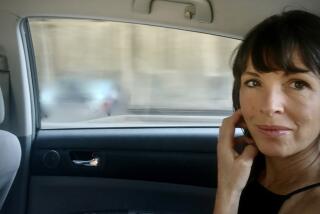Bogosian dabbles with the self-destructive
- Share via
Eric Bogosian has cut a swathe through the performing arts. As a moviemaker, playwright and popular stage artist, he has rocked audiences and critics for more than 20 years, establishing a solid identity as a ruthlessly funny R- to X-rated mirror of personal angst in fin de siecle America. But talent thrives on challenge. Starting with “Mall” in 2000 and continuing with his latest book, “Wasted Beauty,” Bogosian has ventured into new territory: that of the novelist, a serious, contemporary novelist.
The difference between theater, where everything unfolds in the onrushing present, and a novel, where the reader has time to reflect, thumb back, compare and question, isn’t trivial. Changing one’s shtick is a seasoned comedian’s most dangerous risk. Indeed, readers may stumble on awkward moments in “Wasted Beauty,” on passages that are trite, embarrassing, irritating, hard to believe or just plain risible. But there are few boring moments.
Bogosian possesses a race jockey’s sense of timing. From the first sentence -- “She perches on the edge of the gray-white porcelain bathtub and slaps the crook of her Auschwitz-thin arm ... “ -- he’s a stand-up, grab-and-hold-you narrator. The story is as unsubtle and catchy as its title, in which “Wasted” means thrown away and strung out on dope, and “Beauty” refers to a 5-foot-11 farm girl chafing at her dreary prospects until she is serendipitously discovered by a fashion photographer in a New York City McDonald’s. (Think Verushka meets Norma Jean.) Some of the novel’s truest, most evocative paragraphs are those that sketch the bucolic misery of upstate rural New York, the only world Reba and Billy, young siblings left orphaned on an over-mortgaged apple farm, have ever known. On the one hand, “The orchard is soft and dead like a corpse. The soil congested with glacial till and ancient arrowheads.” On the other, “before she understood that this house was old and sad, Reba would run down to the orchard ... and take little bites from the green apples that fell all through the summer. In August she would hurl them at her brother, or aim for the smooth tree bark, exploding them into green shrapnel.”
The writing isn’t always so felicitous. Reba-turned-Rena (it sounds more Elle-ish), who has gone down the slippery slope of big bucks and flattery, sex and drugs, takes off on a woefully belated mission to find and rescue her down-and-out brother. She turns up in the office of Rick, a physician living the American Good Life and loathing every unerotic moment of it. Rick thinks of one patient: “The old guy’s fondling the cusp of senility to begin with. The alcohol will take that cusp and stab it right through his meek old heart.”
Rena and Rick do not meet until page 175, but we understand that they will fall for each other by page 11. Bogosian tends to bully his characters into doing what his plot-script demands. They are monumentally obtuse and choose so badly that one’s heart throbs for them, no matter how blinkered and self-absorbed they are. Everyone uses everyone else. Motivations are left to beg: Why would Rena suck heroin, right after seeing a former model whose life has been ruined by it? Solidarity with a semi-boyfriend who soon disappears from the novel doesn’t ring strong enough. And given his suburban domesticity painted as a sort of hell, why does vacillating Rick decide the passion was wonderful but not to be trusted? He “loves” the wife and kids but he gives no evidence so the reader has trouble believing. And why does Rena put up with his rejections? Manners aside, supposed nice-guy Rick, who is twice her age, treats her as caddishly as the previous jerks. Besides, he can’t be the only guilt-ridden doctor on the Hudson. But then, Reba/Rena is a messed-up accident, a goddess or both.
The best of “Wasted Beauty” is an essay distilled from the bare plot: In Rick’s voice, Bogosian writes a philosophical exploration of the free-for-all battle waged among desire, love and fear. Especially fear: that of living. Eros versus Thanatos. The rest of the story is lurid daytime TV. Talk about your recreational drugs.
*
Kai Maristed is the author of the novels “Broken Ground,” “Out After Dark” and “Fall.”
More to Read
Sign up for our Book Club newsletter
Get the latest news, events and more from the Los Angeles Times Book Club, and help us get L.A. reading and talking.
You may occasionally receive promotional content from the Los Angeles Times.










